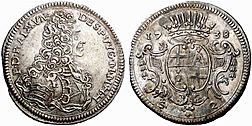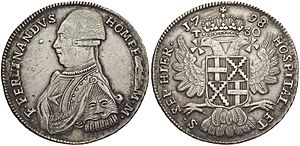Maltese scudo facts for kids
Quick facts for kids Maltese scudo |
|||
|---|---|---|---|
|
|||
| ISO 4217 Code | none | ||
| User(s) | Previously: |
||
| Pegged with | euro €0.24 = 1 scudo |
||
| Subunit | |||
| 1⁄12 | tarì | ||
| 1⁄20 | grano | ||
| 1⁄6 | piccolo | ||
| Plural | scudi | ||
| tarì | tarì | ||
| grano | grani | ||
| piccolo | piccoli | ||
| Coins | 15 piccoli 1, 5, 10 grani 1, 2, 4, 6, 8, 9, 12, 15, 16, 30 tarì 1, 2, 5, 10, 20 scudi |
||
The scudo (say "SKOO-doh") is a special type of money used by the Sovereign Military Order of Malta. This Order is a very old group, like a charity, that helps people around the world. The scudo was also the money used on the island of Malta for a long time, until 1798.
The scudo is divided into smaller parts:
- 1 scudo equals 12 tarì (say "TAH-ree").
- Each tarì is made of 20 grani (say "GRAH-nee").
- Each grano is made of 6 piccioli (say "PIT-choh-lee").
Today, the scudo is linked to the euro. This means 1 scudo is worth about €0.24 (which is like 24 euro cents).
Contents
History of the Scudo
How the Scudo Started
The very first scudo coins were made in a place called Rhodes way back in 1318. By the 1500s, these coins had special designs. One side showed a cross and the coat of arms (like a family symbol) of the Order and its leader, called the Grandmaster. The other side showed the head of St. John the Baptist.
The scudo was first made in Malta when Piero de Ponte was the Grandmaster. The coins got even better quality in the early 1700s, especially when António Manoel de Vilhena was Grandmaster. Sometimes, other countries' money, like Spanish dollars or Louis d'or, could also be used in Malta alongside the scudo.
Scudo Under French and British Rule
In 1798, France took over Malta for a short time. The French melted down silver from churches on the island. They used this silver to make new 15 and 30 tarì coins. These coins still had the old Grandmaster's design from 1798.
After the Maltese people fought back against the French, gold and silver bars were stamped with their value in grani, tarì, and scudi. These temporary coins were used for a short time in the capital city, Valletta, and nearby areas.
Malta then became a British colony. The scudo continued to be used there, along with some other money. But in 1825, the British pound took over as the main currency. One British pound was worth 12 scudi at that time. Even so, some scudi coins were still used until November 1886, when they were officially stopped. A scudo in 1886 was worth about €4.35 in 2011 money.
Modern Scudo
The Republic of Malta now uses the euro as its money, which it adopted in 2008. Before that, it used the Maltese lira starting in 1972.
The Sovereign Military Order of Malta, which is now based in Rome, still makes souvenir coins. These coins are called grani, tarì, and scudi. They have been making them since 1961. The Order also used the scudo for its postage stamps from 1961 until 2005, when they switched to the euro.
Coins
In the past, scudo coins came in many different values and materials:
- Smallest coins were 1, 2+1⁄2, 5, and 10 grani, and 1 tarì. These were made of copper. The 2+1⁄2 grani coin was also called 15 piccoli.
- Silver coins included 2, 4, and 6 tarì, and 1, 1+1⁄4, 1+1⁄3, 2, and 2+1⁄2 scudi. Some of these had other names too, like 15, 16, or 30 tarì.
- The most valuable coins were 5, 10, and 20 scudi, which were made of gold.
Today, the Order still makes some scudo coins for collectors. These include:
- Bronze 10 grani coins.
- Silver 9 tarì, 1, and 2 scudi coins.
- Gold 5 and 10 scudi coins.
In 2011, a very old gold coin from Grandmaster António Manoel de Vilhena, made in 1725, was sold for a lot of money – about US$340,000!
 | Charles R. Drew |
 | Benjamin Banneker |
 | Jane C. Wright |
 | Roger Arliner Young |



